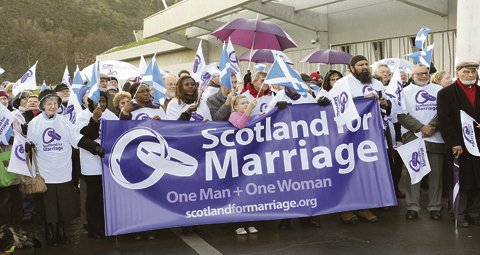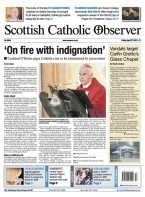BY Ian Dunn | December 9 | ![]() 0 COMMENTS
0 COMMENTS ![]() print
print

Catholic hierarchy alarmed by same-sex ‘marriage’ consultation
Cardinal O’Brien, Bishop Tartaglia express their concern over foreign participation in Scottish issues to First Minister; Archbishop Conti alarmed by hostility towards Church
Cardinal Keith O’Brien and Bishop Philip Tartaglia of Paisley have written to the First Minister and the Deputy First Minister seeking clarifications on whether the submissions of foreign homosexual activists will be accepted by the Scottish Government’s same-sex ‘marriage’ consultation, which closes today.
The foreword of the consultation, which closes today, said that views on whether or not the definition of marriage should be changed would be sought ‘all sections of Scottish society.’
In recent weeks pro same-sex marriage lobbying groups Scotland have urged their supporters to submit responses whether or not they live in Scotland. The Scottish Government has suggested that such responses would be accepted but identified separately.
Fear of subversion
In his letter, Cardinal O’Brien has said the consultation would be ‘utterly subverted’ if foreign submission were accepted.
“Allowing thousands of respondents outwith Scotland to actively participate in our political process utterly subverts this stance,” the cardinal said. “Even to collate and separately identify non-Scottish responses would be to undermine the singular sovereignty of the Scottish people.”
Both the cardinal and Bishop Tartaglia have called for an urgent clarification that only submissions from Scotland will be evaluated by the Scottish Government.
Hostility to Church
Also this week Archbishop Mario Conti of Glasgow this week criticised advocates of same-sex ‘marriage’ for their intemperate and hostile language towards the Catholic Church.
Archbishop Conti said he had been repeatedly criticised as being ‘homophobic’ and ‘intolerant’ by advocates for same-sex ‘marriage’ but said that he knew he was neither.
“Those who chant intolerance at those who hold to an immemorial tradition, the subject of Christian and Muslim teaching and indeed of universal practice, should ask themselves if they are not also being intolerant,” he said.
“If intolerance means simply disagreeing with what others hold. In a democracy, a majority vote can determine policy with regard to moral matters but has no bearing on whether such matters are in themselves right or wrong.”
Christian support
The Catholic Church’s stance against same-sex ‘marriage’ has been backed by the Church of Scotland. The Kirk’s submission to the Scottish Government’s consultation on redefining marriage is also against change. The response form the Kirk’s legal questions committee expressed concern at the speed at which the Scottish Government seemed to be moving.
“The government’s proposal fundamentally changes marriage as it is understood in our country and our culture—that it is a relationship between one man and one woman,” their statement said. “In common with the historic position of the Christian Church, the Church of Scotland has always viewed marriage as being between one man and one woman.
“Scriptural references to marriage, whether literal or metaphorical, all operate under this understanding.
“To redefine marriage to include same-sex marriage may have significant and, as yet, inadequately considered repercussions for our country, for the well-being of families, communities and individuals.”
The Scottish Episcopal Church has also opposed the legalisation of same-sex ‘marriage’ in their submission to the consultation.
The Scottish branch of the Anglican communion said that their current church law would not allow for a civil partnership to be registered through a religious ceremony in an Episcopal church.
Bishop Mark Strange of Moray, Ross and Caithness, the Convener of the Faith and Order Board’s working group on the consultation, said: “The Church’s current position is that marriage is a union between a man and a woman and this clarity allows us the space to listen to the many differing views held by the members of our Church.”
Marriage campaign
Coming the week after the inter-faith march on the Scottish Parliament to launch Scotland for Marriage, John Deighan the Catholic Church’s parliamentary officer, said the ecumenical support for the sanctity of traditional marriage was very welcome.
“It was a big boost,” he said “It was a very measured, very thoughtful response. I think it shows that this is an act of cultural vandalism overturning 1000 years of accepted societal norms.”
Mr Deighan said the Catholic Church and the other members of the Scotland for Marriage campaign intended to keep the pressure on the Government after the closure of the consultation period.
“They have 12 weeks to deliver their recommendation after the consultation closes,” he said. “It’s very important that the campaign keeps building during that time. We think it’s very important to focus on the spiritual dimension so we’re in the process of organising novenas, and 24 hours of prayer for the cause in various parishes.”
Pics: PAUL McSHERRY. (Above) Scotland for Marriage supporters of traditional marriage marched to the Scottish Parliament last Wednesday. (Below) Cardinal Keith O’Brien seen signing the Scotland for marriage petition












